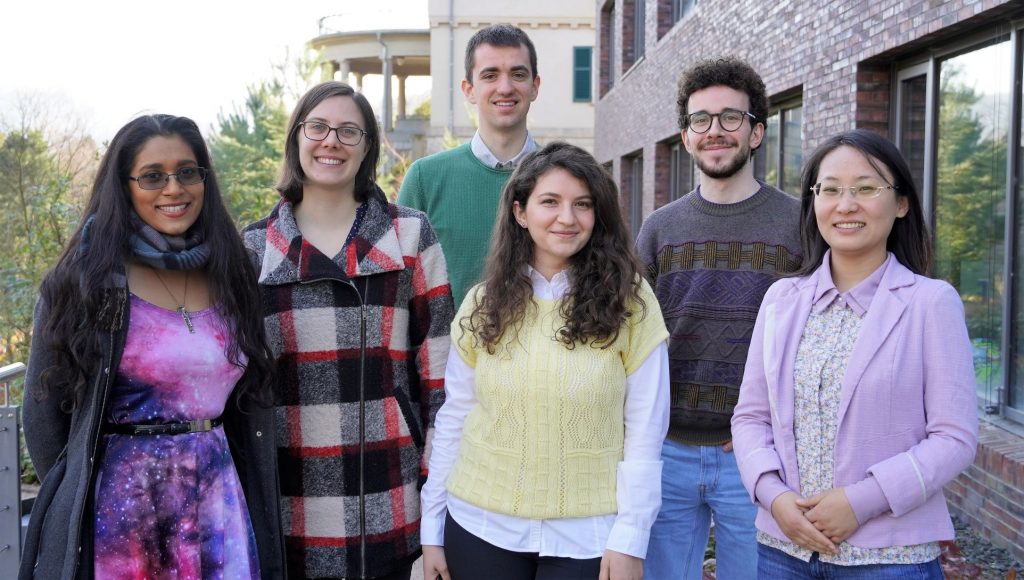More than just a game: How long can there be life on Earth?
Researchers at the Heidelberg Institute for Theoretical Studies (HITS) receive 10,000 Euros in the university competition “Our Universe” for developing a board game on the habitability of planets.
How can research be made accessible and tangible for everyone? Every year, students and researchers take part in the university competition organized by Wissenschaft im Dialog (WiD) and face this challenge. The Year of Science 2023’s theme is “Our Universe”. 76 entries communicating ideas about the “Universe” were submitted. Only 15 were selected, among them a concept by a team of young researchers at the Heidelberg Institute for Theoretical Studies (HITS). Their idea: a board game called “Habitable” that links astronomy with the climate crisis by motivating players to create a habitable planet where life is possible despite changing conditions. The researchers will receive funding of 10,000 euros to implement their idea.
To date, more than 5,000 planets have been discovered orbiting other stars in the universe, called exoplanets. Most of them are unlikely to host life, but a fraction are located in a particular region, called the habitable zone. Within our solar system, three planets exist within the habitable zone around the Sun, but only Earth is known to host life. Due to the activity of the human life, the mean temperature of our planet and other crucial properties are changing rapidly, causing real danger to its habitability.
How does life exist on a planet and when does it come under threat? With this question in mind, HITS astrophysicists Eva Laplace, Dandan Wei, Jan Henneco, Duresa Temaj, Vincent Bronner, Rajika Kuruwita and Julian Saling applied to the university competition. While committed to computer-based research, they intentionally designed their entry as a tabletop game. “We are all big fans of board games,” says Eva Laplace, “and we wanted families and friends to enjoy a fun game that inspires its players to think about climate change, the habitability of our planet and humankind’s impact on it.”
The scientists develop the game together with the public by organizing several game-testing events facilitated by HITS and the outreach center “Haus der Astronomie” (HdA) in Heidelberg. During these test runs, the game developers gather the public’s feedback and suggestions, and hope to engage in a dialog about habitability and the impact of global warming.
“We are very excited about this award for our young researchers,” says HITS Managing Director Gesa Schönberger. “Exploring the views of astronomers in such a playful way is very refreshing. We are keen to build bridges between research and the general public. And the additional perspective on climate change, which concerns us all, makes a valuable contribution to this.”
“Wissenschaft im Dialog” offers additional training courses and events on science communication to the winners of the competition, where they can network and delve into project management, evaluation, public relations and social media. At the end of the year, the projects will be reviewed to see which teams have communicated the topic of the universe in a particularly creative and accessible way. The “Habitable” team will provide regular updates via social media.
More about the university competition of “Wissenschaft im Dialog” (in German): https://www.hochschulwettbewerb.net/2023/
HITS
HITS, the Heidelberg Institute for Theoretical Studies, was established in 2010 by physicist and SAP co-founder Klaus Tschira (1940-2015) and the Klaus Tschira Foundation as a private, non-profit research institute. HITS conducts basic research in the natural, mathematical, and computer sciences. Major research directions include complex simulations across scales, making sense of data, and enabling science via computational research. Application areas range from molecular biology to astrophysics.
An essential characteristic of the Institute is interdisciplinarity, implemented in numerous cross-group and cross-disciplinary projects. The base funding of HITS is provided by the Klaus Tschira Foundation.
Press Contact
Angela Michel
Communications
HITS Heidelberg Institute for Theoretical Studies
Phone: +49-6221-533-329
angela.michel@h-its.org
About HITS
HITS, the Heidelberg Institute for Theoretical Studies, was established in 2010 by physicist and SAP co-founder Klaus Tschira (1940-2015) and the Klaus Tschira Foundation as a private, non-profit research institute. HITS conducts basic research in the natural, mathematical, and computer sciences. Major research directions include complex simulations across scales, making sense of data, and enabling science via computational research. Application areas range from molecular biology to astrophysics. An essential characteristic of the Institute is interdisciplinarity, implemented in numerous cross-group and cross-disciplinary projects. The base funding of HITS is provided by the Klaus Tschira Foundation.
